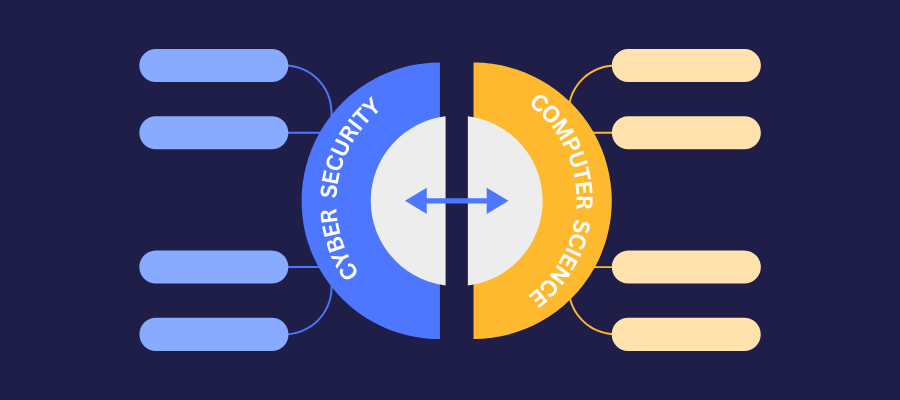This cybersecurity vs computer science guide will help you understand the key differences between them in terms of career scope.
So, if you’re struggling to choose a career option between a cybersecurity career and a computer science career, you will find the answer here.
Here’s what you’ll learn:
Cybersecurity vs computer science (comparison table)
| Aspects | Cybersecurity | Computer Science |
| Focus Areas | It is a study of computation, algorithms, and computer-related systems. | To ensure the confidentiality, availability, and integrity of data sources |
| Aim | On the security measures of data, network, and systems. | Problem-solving related to modern technologies and innovation based on them |
| Primary Focus | To develop software, hardware, and solutions related to them. | On various ranges of computing areas. |
| Related Subfields | Network Security and Management, Cryptography, Ethical hacking, etc. | AI, Database and management, Software engineering, etc. |
| Core Agenda | Prevent and mitigate possible security breaches. | Programming languages, data structures, and algorithms. Diverse programs including software engineering, AI, etc. |
| Related Skill Sets | Threat analysis, penetration testing, risk assessment, etc. | Programming with different languages, designing new algorithms, developing system architecture, etc. |
| Related Job Titles | Security Analyst, Ethical Hacker, Security Consultant, etc. | Software Developer, Systems Analyst, Data Scientist, etc. |
| Focused Career Path | Focused on protecting digital assets and privacy related to it | Focused on software development and system development |
| Ethical Prospects | Deal with the legal aspects of cybersecurity and ethical hacking | Consider ethical and social implementations of computing |
| Education and Required Knowledge | Specialized programs in cybersecurity. Like networking protocols, encryption techniques, security frameworks | Programming languages, data structures and algorithms. Diverse programs including software engineering, AI, etc. |
| Related Challenges | Evolving cyber threats, data breaches, privacy concerns, etc. | Advancing technology, AI ethics, software vulnerabilities, etc. |
What is cybersecurity?
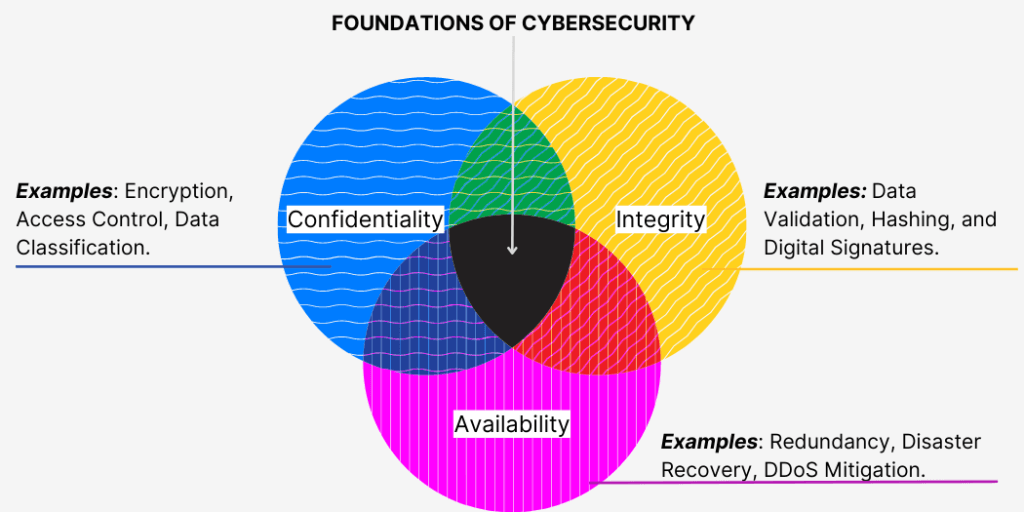
Cybersecurity is the practice that protects computer systems, networks, sensitive data, and digital resources from different types of cyber threats and unauthorized access.
The preliminary goal is here to ensure the confidentiality and availability of those digital information. It also maintains the overall functionality of digital systems which encircles a wide range of standards and approaches which has been designed to prevent, detect, respond to, and recuperate from cyber threats and attacks.
What is computer science?
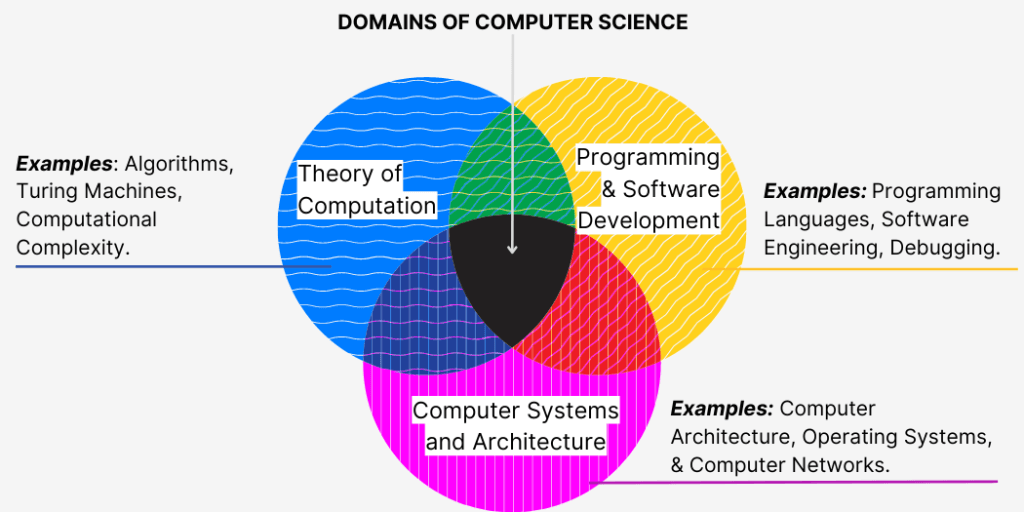
Computer Science is the field of computers and computational systems that aims to find solutions to modern-age problems. It also includes the computers and computational systems design and its development, in solving complex problems. Computer scientists develop new algorithms by using modern programming languages, and tools that drive innovation across industries, from healthcare to entertainment to finance.
What pays more — cyber security or computer science?
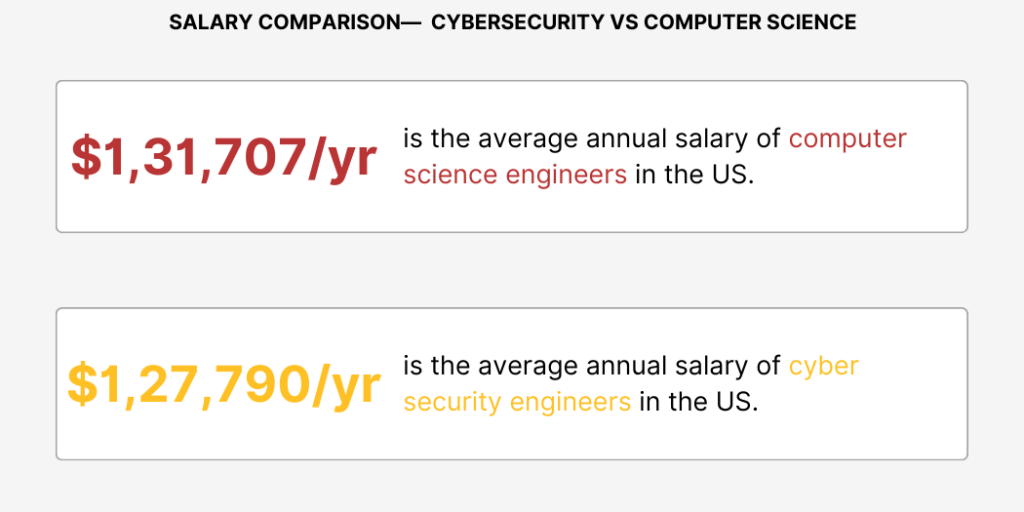
The average annual salary of cybersecurity engineers and computer science engineers is $1,31,707/yr and $127,790 respectively. So, in this comparison, cybersecurity offers higher earning potential as compared to traditional computer science.
However, the earning potential in both Cybersecurity and Computer Science can vary depending on various factors such as:
- Location
- Education level
- Years of experience of the candidate
- The industry you currently work in
Cyber security salary in the US
The salary range for cybersecurity professionals in the United States may vary significantly on the basis of so many factors. The factors may vary such as relevant experience, related education, specific job role, and the industry you are working in.
Below you can see the approximate salary ranges for various cybersecurity roles:
| Cybersecurity job role | Salary Range (USD per year) |
|---|---|
| Cybersecurity Analysts | Starting at $96,962 |
| Security Engineers | $131,702 – $140,000+ |
| Ethical Hackers | Experienced: $112,742+ |
| Security Consultant Personnel | Up to $169,000 |
| Security Architect Developer | Experienced: $244,979+ |
| Chief Information Security Officer | Projected: $290,122 |
1. Cybersecurity Analysts
It is an entry-level role that often starts at around $96,962 per year. As per the potential and experience of the salary can increase.
2. Security Engineers
They are mid-level security engineers who might earn around $1,31,702 per year. But more experienced professionals could make even more, than $140,000 or higher.
3. Ethical Hackers
The particular role of ethical hackers and penetration testers in the US market can vary widely. But experienced professionals belonging to this field may earn $1,12,742 per year in the United States.
4. Security Consultant Personnel
On the basis of the development organizations and the experience level. The security consultant personnel can earn US $169,000 each year.
5. Security Architect Developer
This position involves the designing and implementing of security systems. For this particular role, an experienced person can earn $2,45,063 per year.
6. Chief Information Security Officers
It is a leadership role such as Chief Information Security Officer that can have substantial earning potential. The projected salary for this role is $2,90,316 per year.
Computer science salary in the USA
The average salary of a computer scientist in the USA is around $153,148 per year. The factors may vary such as relevant experience, related education, specific job role, and the industry you are working in.
| Computer science job role | Salary Range (USD per year) |
|---|---|
| Software Developer | Fresher: $139,000, Mid-Level: $172,000, Senior: $192,000+ |
| Data Scientist | $152,000+ |
| Machine Learning Engineer | $151,000+ |
| Artificial Intelligence (AI) Engineer | $160,000+ |
| Software Architect | $215,000+ |
| Database Administrator (DBA) | $105,000+ |
| Computer Systems Analyst | $102,000+ |
| Chief Technology Officer (CTO) | $319,000+ |
Below you can see various computer science roles with their approximate salaries:
1. Software Developer / Software Engineer
Salaries for software engineers or developers may vary based on which type of software they can develop. Here technology plays a big role also with the developer’s experiences.
- In the USA, the starting salary is around $139K per year for a fresher.
- Mid-level software engineers can earn yearly around $172K.
- As there is a high demand for senior software engineers in the USA, they can earn over $192K per year easily.
If you’re looking to start your software development career journey, then these free software engineering courses will help you.
2. Data Scientist
Data scientists with advanced degrees and experiences may earn $152K per year. But it depends on the project’s complexity and that particular company.
3. Machine Learning Engineer
As machine learning is the hot cake in the tech market, ML engineers can command their salary with their skills. The specific salary can be $151K or higher.
4. Artificial Intelligence (AI) Engineer
Nowadays, artificial intelligence has become more popular compared to many other technologies. Proficient AI engineers can earn around $160K Per year.
5. Software Architect
Architects design complex software systems. They can earn easily $215K or higher.
6. Database Administrator (DBA)
Database administrators can earn $105K per year. They can earn more on the basis of their experience and capabilities to handle complex systems.
7. Computer Systems Analyst
Professionals who are responsible for analyzing and improving computer systems may earn salaries of $102K per year.
8. Chief Technology Officer (CTO)
CTO is a well-decorated leadership role. They are responsible for developing the strategy of the tech flow, command salaries that often exceed $319 K per year, and can reach well into the six figures.
Salary pay differences between computer science vs cybersecurity
In Computer Science, the roles and responsibilities related to software engineers, machine learning engineers, and data scientists can command high salaries. The job roles may differ based on their experience and expertise in high-demand areas in this modern era like AI, machine learning, and software development.
On the other hand, the roles like cybersecurity analysts, penetration testers, and security developers can also offer competitive salaries due to the increasing demand for proficient experts to protect digital data sources and combat potential cyber threats.
Career options and scopes in cyber security and computer science
Cyber security and computer science, both offer a wide range of career opportunities. Depending on the skill set and specialties the opportunities may differ. Here is an overview of the potential career paths available in both fields:
Cybersecurity career options
1. Cybersecurity Analyst
Cybersecurity Analysts monitor various networks, detect potential security breaches, and respond quickly to cybersecurity threats.
2. Ethical Hacker / Penetration Tester
Ethical hackers hack the systems ethically to identify vulnerabilities of the systems. They also help organizations to improve their security measures.
3. Security Consultants
They usually advised organizations on their security measures by conducting risk assessments and also designing various security strategies for the future.
4. Security Engineer
Security engineers design and implement various security systems, firewalls, and protocols related to encryptions.
5. Security Architects
They usually develop and implement different security protocols and frameworks for complex systems.
5. Incident Responder
Incident responders mainly investigate and respond to cybersecurity incidents by coordinating with recovery efforts.
6. Cryptographer
Cryptographers mainly design different cryptographic algorithms for computer systems to protect the sensitive data present in them.
7. Security Researcher
They usually conduct so much research on the system to discover new threats developed in the system and neutralize them by using mitigation techniques.
8. Threat Intelligence Analyst
They usually analyze various threat data to predict and prevent future cyber-attacks.
9. Chief Information Security Officer (CISO)
Oversee an organization’s entire security strategy and implementation.
Computer Science career options
1. Software Developer / Engineer
They usually design, develop, and test different software applications for various platforms, to sustain the main purposes.
2. Data Scientist
Usually extracts insights from huge datasets by using various statistical and machine learning commands.
3. Machine Learning Engineer
These engineers develop modern machine learning models and algorithms to run different applications.
4. Artificial Intelligence (AI) Engineer
AI engineers became high-paid professionals in this era. They develop AI systems that can perform various tasks at a time like humans.
5. Software Architect
This personnel creates top-notch designs for modern software systems to ensure scalability by boosting the system’s performance.
6. Database Administrator
The DBA administrators manage the databases by optimizing the queries and ensuring data integrity and security of the process.
7. Web Developer
Web developers design and create websites with web applications by using various programming languages and related frameworks.
8. Systems Analyst
System analysts mainly analyze and improve computer systems and increase development capabilities to enhance project efficiency.
9. Game Developer
The most interesting job role is related to computer science. The professionals usually design and develop various video games of different grains for various platforms, PCs, and mobile devices.
10. Network Engineer
The main work of network engineers is to design, implement, and manage computer networks to ensure efficient data communication.
11. UI/UX Designer
Creates user-friendly interfaces to enhance user experiences mainly for software applications.
12. Computer Scientist / Researcher
Contributes to the advancement of computer science through research in various subfields.
Career path differences between cybersecurity and computer science
Cybersecurity focuses mainly on the process of safeguarding various systems and data breaches. With related roles like ethical hacking and security analysis, cybersecurity provides a vast way out for computer security measures.
Cybersecurity Career Path
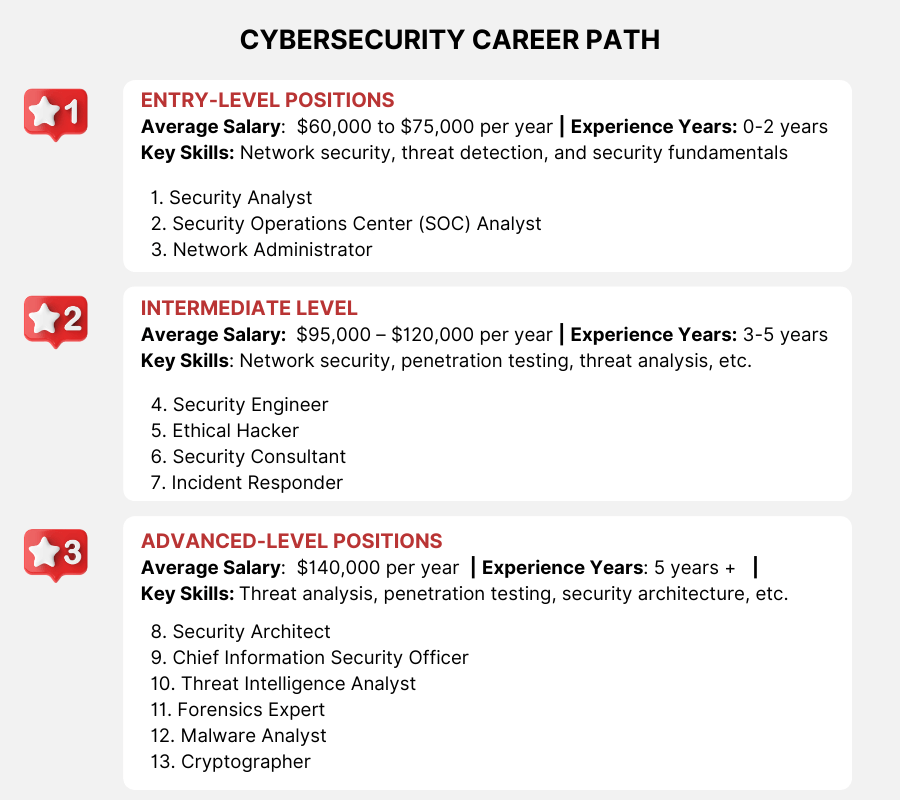
Entry-Level Positions:
Average Salary: $60,000 to $75,000 per year
Experience Years: 0-2 years
Key Skills: Network security, threat detection, and security fundamentals
1. Security Analyst
This role implicates observing networks and systems for security breaches and enforcing basic security measures.
2. Security Operations Center (SOC) Analyst
Security Operations Center analysts monitor and respond to security alerts. They analyze data to detect and stem cyber threats.
3. Network Administrator
While not exclusively a cybersecurity role, network administrators play a crucial part in maintaining secure network configurations and infrastructure.
Intermediate-Level:
Average Salary: $95,000 – $120,000 per year
Experience Years: 3-5 years
Key Skills: Network security, penetration testing, threat analysis, incident response
4. Security Engineer
Security engineers develop, enforce, and manage security solutions, including firewalls and encryption protocols.
5. Ethical Hacker
Professionals attempt to pinpoint vulnerabilities in systems and applications by simulating real-world cyberattacks.
6. Security Consultant
Consultants suggest possible solutions to organizations, enabling them to assess their security stance and implement best practices.
7. Incident Responder
Responsible for operating and mitigating security incidents, coordinating response efforts, and minimizing the impact of breaches.
Advanced-Level Positions:
Average Salary: $140,000 per year | Experience Years: 5 years + | Key Skills: Threat analysis, penetration testing, security architecture, and risk management.
8. Security Architect
Security architects configure and construct the overall security framework for an organization.
9. Chief Information Security Officer (CISO)
They are top-level administrators accountable for an organization’s cybersecurity strategy, policies, and governance.
10. Threat Intelligence Analyst
Threat intelligence analysts collect and interpret information about emerging cyber threats.
Specialized Roles:
Average Salary: $250,000+ per year | Experience Years: 5 years + | Key Skills: Cybersecurity frameworks, threat detection and mitigation, penetration testing techniques, security architecture design, risk assessment, compliance standards (such as GDPR, HIPAA), and strong communication and leadership skills for managerial roles.
11. Forensics Expert
Forensics experts examine cyber incidents, gather evidence, and provide details that can be used in legal proceedings.
12. Malware Analyst
Malware analysts investigate malicious software to understand its behavior and design countermeasures.
13. Cryptographer
Cryptographers design encryption algorithms and strategies to ensure data and communications.
Computer Science Career Path
Entry-Level Positions:
Average Salary: $65,000 per year
Experience Years: 0-2 Years
Key Skills: Programming languages (e.g., Java, Python), problem-solving, coding, software design
1. Software Development Intern
Helping in coding, testing, and debugging software under the guidance of senior developers.
2. Junior Programmer
Develop and maintain code for software applications, understanding foundational programming languages and techniques.
3. Web Development Intern
Assist in creating web interfaces, and understanding HTML, CSS, and JavaScript basics.
Early Career Positions:
Average Salary: $65,000 to $85,000 per year | Experience Years: 0-3 Years | Key Skills: Programming, Data Structures, Algorithms, Software Development, Problem Solving.
4. Software Engineer
Develop, test, and maintain code for software projects, cooperating with teams to provide functional applications.
5. Front-End Developer
Design user interfaces, operate on user experience (UX), and blend creations with web technologies.
6. Back-End Developer
Design server-side logic, operate on databases, and develop APIs to power web applications.
Intermediate Positions:
Average Salary: $85,000 to $110,000 per year | Experience Years: 3-7 Years | Key Skills: Programming languages, software development, algorithm design, and problem-solving.
7. Senior Software Engineer
Conduct development projects, assist junior developers, and contribute to architecture decisions.
8. Full Stack Developer
Full Stack developers have expertise in both front-end and back-end development.
9. Database Administrator
Configure and optimize databases to ensure data integrity, and manage performance tuning.
Mid-Level Positions:
10. Lead Developer
Lead development units, direct technical decisions, and manage project implementation.
11. Machine Learning Engineer
Design and deploy machine learning models, cooperating with data scientists and engineers.
12. Security Analyst:
Observe and respond to security problems, assess susceptibilities, and propose modifications.
Senior Positions
Average Salary: $150,000 – $180,000 per year | Experience Years: 8+ | Key Skills: Advanced programming, software architecture, project leadership, problem-solving.
13. AI Research Scientist
Conduct advanced research in AI to contribute to cutting-edge advancements, and publish conclusions.
14. Chief Information Officer (CIO)
Manage an organization’s technology procedure, aligning IT with business objectives.
Executive Positions
Average Salary: $150,000 to $250,000 per year | Experience Years: 10+ | Key Skills: Leadership, strategic planning, team management, and technical expertise.
15. Chief Scientist
Deliver thought leadership, shape analysis plans, and drive innovation across the organization.
16. Chief Data Officer (CDO)
Handle data strategy, management, and analytics to derive the highest value from data assets.
Career path differences between computer science vs cybersecurity
Computer science involves various development strategies of software, artificial intelligence, IoT, data analysis, and so many development processes of system architectures. Cybersecurity professionals’ top priority is to protect against threats, while computer scientists create innovative technologies to overcome modern problems.
Career paths may vary in their emphasis on different security measures or software/system advancement.
What are the certification options in Cybersecurity and computer science?
Cybersecurity and Computer Science, both are vast fields with different certification options. These certifications can help you to enhance your technical knowledge and skills in these particular fields.
Cybersecurity Certifications
Use the following certification programs to start your cybersecurity career:
- CompTIA Security+: A basic certification that covers all essential cybersecurity concepts and skills related to it.
- Certified Information Systems Security Professional (CISSP): It is a globally recognized certification course, specifically designed for experienced security practitioners.
- Certified Ethical Hacker (CEH): The course structure focuses on various ethical hacking techniques. It helps to identify and mark those vulnerabilities present in the systems.
- Certified Information Security Manager (CISM): Related to information security management.
- Certified Information Systems Auditor (CISA): The course mainly focuses on audit and control of the process.
- Cisco Certified Network Associate (CCNA) Cyber Ops: The main focus of the certification is to perform various security operations skills in a Cisco networking environment.
- Certified Cloud Security Professional (CCSP): This certification will make you an expert in the cloud security domain.
- GIAC Security Essentials (GSEC): The certification provides a broad understanding of information security concepts with its practical implementation.
- CompTIA Cybersecurity Analyst (CySA+): This course structure focuses on the modern threat detection process and the process of analysis related to it.
Find the complete cybersecurity syllabus here.
Computer Science Certifications
Use the following certification programs to start your computer science career:
- Cisco Certified Network Associate (CCNA): The certification focuses on basic networking fundamentals.
- CompTIA A+: It covers essential information technology skills with troubleshooting operations on various software and hardware.
- Microsoft Certified Azure Fundamentals: Discuss the basic concepts of cloud services and Microsoft Azure.
- Microsoft Certified Azure Developer Associate: Validates various skills to develop applications by implementing the Azure platform.
- AWS Certified Solutions Architect: Demonstrates expertise in developing and deploying scalable systems on Amazon Web Services.
- Certified Software Development Professional (CSDP): Focuses on software engineering and development best practices.
- Google Associate Cloud Engineer: Validates skills in deploying applications and infrastructure on Google Cloud.
- Certified Information Systems Security Professional (CISSP): It’s applicable in both fields as security is a cross-cutting concern.
- Certified ScrumMaster (CSM): Focuses on Agile methodologies and project management.
- Oracle Certified Professional (OCP): Various tracks are available, including database administration and Java programming.
Job roles and responsibilities
Cybersecurity analysts and computer science engineers both contribute significantly to the modern technology landscape. But as per the field of work, their focus and scope are different. Cybersecurity analysts focus on safeguarding digital assets by recognizing and preventing security breaches, whereas computer science engineers focus on creating and maintaining software and hardware systems.
What do cybersecurity analysts do?
Cybersecurity analysts are accountable for:
- Safeguarding an organization’s digital assets and information from cyber threats and attacks.
- Observe network activity, study security logs, and evaluate vulnerability factors to recognize and mitigate possible threats.
- Involve developing and enforcing security measures, developing incident reaction plans, and staying updated on emerging cyber threats and technologies.
What do computer science engineers do?
Computer science engineers are primarily concentrated on:
- Developing and maintaining software and hardware techniques.
- Develop innovative software applications, work on computer architecture, and configure algorithms to solve complicated computational problems.
- Engage in system analysis, testing, and debugging to guarantee the functionality and efficiency of their developed goods.
Key required skills and prerequisites
Both cybersecurity professionals and computer science engineers need a foundation of modern coding languages, but their focus zones will always differ.
Cybersecurity specialists require skills associated with different security tools, encryption methods, and risk assessment. On the other hand, computer science engineers emphasize software development methods, algorithm design, and design system architecture.
Find the top cybersecurity courses in Mumbai.
Cybersecurity Skills and Prerequisites
- Cybersecurity experts require a strong foundation in information security concepts, network protocols, and risk assessment.
- They should have expertise in using safety tools and technologies, comprehending encryption techniques, and analyzing safety logs.
- A concrete understanding of programming languages like Python and knowledge of operating systems is helpful.
Prerequisites for an occupation in cybersecurity generally include a degree in computer science, information technology, or an affiliated field.
Certifications such as CompTIA Security+, Certified Information Systems Security Professional (CISSP), and Certified Ethical Hacker are advantageous for showcasing expertise in this particular field.
If you’re looking to start learning programming languages, then this guide on how to become a Python developer will help you.
Computer Science Skills and Prerequisites
- Computer science engineers need a profound knowledge of coding languages like Java, C++, or Python.
- They should have some proficiency in software development methodologies.
- They should be proficient in algorithm design, data structures, and system architecture.
- Knowledge of databases, software testing, and version control systems is crucial.
A degree in computer science or a corresponding domain is the preliminary prerequisite, though some roles might need supplemental specialization like artificial intelligence or software engineering.
Similarities — How is cybersecurity related to computer science?
Cybersecurity and computer science are interconnected and depend on shared knowledge, technology, and problem-solving approaches. It addresses the challenges and prospects presented by the modern digital landscape. While they have distinct focuses, their relationship is integral in building secure, efficient, and innovative digital systems.
1. Foundation in Computing
Both cybersecurity and computer science stem from a shared foundation in computing principles.
2. Technology Expertise
Experts in both domains require a solid knowledge of technology features such as networks, operating systems, databases, and coding languages.
3. Problem-Solving Approach
Both cybersecurity specialists and computer scientists employ problem-solving skills to tackle tricky challenges.
4. Coding and Scripting
Coding and scripting both skills are important for both cybersecurity analysts and computer science engineers.
5. Data Protection
Both fields are concerned with protecting sensitive data. Both domains deal with data and its processing with proper storage, and security. Computer scientists develop databases and data management techniques, while cybersecurity professionals concentrate on ensuring data confidentiality, probity, and availability.
6. Continuous Learning
Given the dynamic nature of technology and security threats, professionals in both fields must engage in continuous learning.
7. Interdisciplinary Collaboration
The realms of computer science and cybersecurity often require collaboration with other disciplines.
8. Ethical Considerations
Both fields involve ethical considerations.
FAQs
1. Is cybersecurity harder than computer programming?
Both cybersecurity and computer programming are formidable in their own forms. Cybersecurity concerns understanding complicated hazards and securities, while programming needs mastering different coding languages and problem-solving. The level of complication relies on individual aptitude and interests.
2. Is Master’s of Science in cybersecurity really worth it?
Opting for a Master’s in Cybersecurity presents in-depth expertise in technological roles and career advancement. Its importance is meaningful when aligned with purposes and industry demand. Assess program offerings, job opportunities, and ROI ahead. While normally worthwhile in 2023, assume cases where the investment might not yield significant benefits, if applicable.
3. Would it be better to pursue Computer Science or Cyber Security first?
Determining between Computer Science and Cybersecurity depends on job preferences. Computer Science offers broader tech skills, while Cybersecurity concentrates on safeguarding systems.
4. Should you do a Bachelor of Science in Cybersecurity or Computer Science?
Choosing between a Bachelor of Science in Cybersecurity or Computer Science relies on your interests. Cybersecurity concentrates on protecting technology and data from hazards, while Computer Science surrounds more comprehensive elements of technology development. Consider your career objectives and choices to make the right choice.

Article by
Mouri Roy
Mouri Roy is a dedicated Software Developer and a fervent Technical Content Writer, currently in pursuit of her B-Tech in Computer Science and Engineering at Techno Main Salt Lake. Her expertise includes Java, ReactJs, NodeJs, ExpressJs, MongoDB, SQL, HTML, CSS, JavaScript, and Bootstrap, making her a versatile and sought-after developer.

